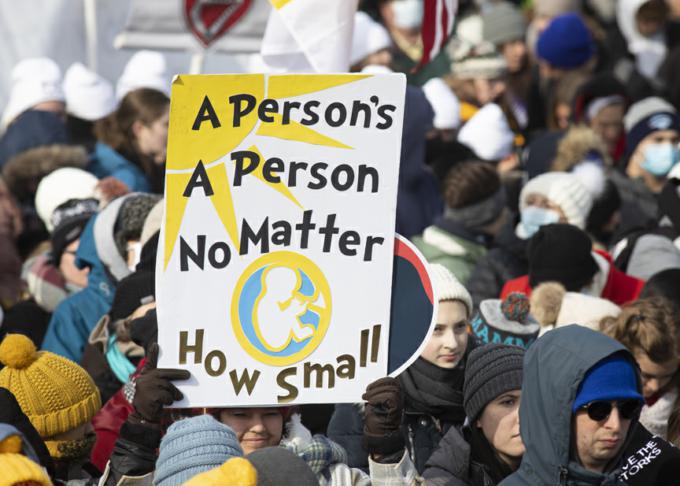
Culture
Roe recognized unborn babies as at most “potential life,” such that a mother’s health interest, no matter how slight, would always overcome a fetus’ life interest, no matter how compelling.

Duncan
It appears that a majority of the U.S. Supreme Court is ready to overturn the legal precedent and binding authority of Roe v. Wade, established nearly 50 years ago in 1973, as well as Planned Parenthood v. Casey, the 1992 decision 30 years ago which reaffirmed what it called the essential holding of Roe. I never thought I'd live to see this happen. I was 21 and a senior in college when Roe came out, and I remember quite well the disappointment on the pro-life side when Casey decided to dig deeper in ensconcing abortion as a constitutional right. Those days seem numbered, God willing.
We know about it because of a draft majority opinion written by Justice Samuel Alito for at least five justices, and possibly including the Chief Justice. This leak of a draft opinion is unprecedented in Supreme Court history, and has unleashed a torrent of pro-abortion demonstrations, including at the houses of the majority justices, as well as pressure and outrage directed at the putative majority and pro-lifers in general, including firebombing their offices. It seems unlikely that the mobs agitating against this judicial opinion have even read it, as it makes a very solid legal and logical argument.
Ideally, this decision should now be issued as soon as possible, to avoid untoward political or even violent interference with judicial independence and the orderly process of the rule of law. The latest it should issue is by the end of the term in late June or early July, once the opinions, including dissenting opinions expected from the court's Democratic appointees, are finalized.
The pending Dobbs case, which deals with whether Mississippi's law banning abortions after the 15th week is constitutional, thus threatens to overturn existing abortion precedent. Together, Roe and Casey stand for the proposition that prior to fetal viability, when the unborn child is capable of living outside his or her mother's womb, abortions can only be regulated in incidental ways that do not pose a substantial obstacle in the way of a woman actually obtaining an abortion.
Subsequent to viability, approximately the third trimester of the pregnancy, abortions can theoretically be prohibited by law, but only if the woman's health is not adversely affected. The companion case of Doe v. Bolton, decided the same day as Roe, decreed that medical judgment as to whether an abortion was necessary should include "all factors -- physical, emotional, psychological, familial, and the woman's age." In practice, this meant that abortion was available on demand throughout the pregnancy. Any woman who wanted an abortion enough at whatever stage of pregnancy, up until the moment of live birth, could get one. While a majority of Americans seem to favor the retention of Roe, they do not favor the abortion-on-demand culture that Roe entailed.
Overturning these cases will return the regulation of abortion to the legislative process, will allow political compromises on the issue, as opposed to all-or-nothing constitutional litigation, and will result in a varied patchwork of abortion regulation throughout the nation. Some places, like Massachusetts, have extremely permissive abortion laws which go well beyond Roe, but others have enacted or will enact more restrictive laws.
The nature of the constitutional law hitherto governing abortion was totally one-sided, since it viewed the unborn fetus as legally nothing, not a "person." (Even the notorious Dred Scott decision that hastened the Civil War recognized that an African-American was a person, just not a citizen capable of bringing suit in federal court.) Roe recognized unborn babies as at most "potential life," such that a mother's health interest, no matter how slight, would always overcome a fetus' life interest, no matter how compelling. This from a constitution that never uses the word abortion, nor pregnancy -- nor marriage nor family, for that matter.
There is a lot of phony fearmongering in the media about this prospective overturning of Roe. Justice Alito's draft opinion says in at least two places that the case is limited to abortion, since unlike contraception, homosexual sex and, most implausibly, interracial marriage, which we are now being told are under attack as well, abortion involves an innocent and non-consenting third party, namely the unborn child, who is unquestionably a living human being entitled to respect. So the substantive due process and equal protection cases that purport to ground those other privacy or autonomy rights in the constitution are not put into question by Dobbs, if it finally does overturn Roe and Casey. It's about time.
- Dwight G. Duncan is professor at UMass School of Law Dartmouth. He holds degrees in both civil and canon law.
Recent articles in the Culture & Events section
-
Boston and the nation respond to the San Francisco Earthquake of 1906Thomas Lester
-
See you in the storyLaura Kelly Fanucci
-
'Dignitas' and the mediaRussell Shaw
-
Scripture Reflection for April 14, 2024, Third Sunday of EasterDeacon Greg Kandra
-
St. Helena's House is established in the South EndThomas Lester


















